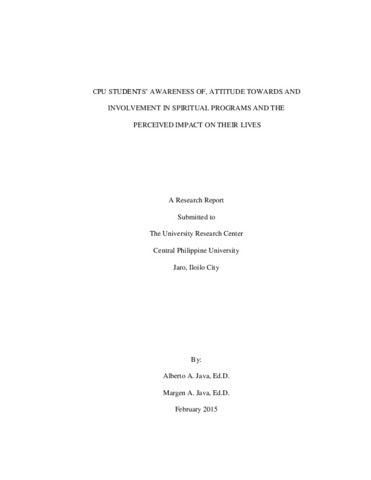| dc.description.abstract | The purpose of this study was to identify the adjustment problems of freshmen college students on three areas namely, personal/emotional, social/interpersonal, and academic. The area on personal/emotional adjustment problems comprised the following aspects: self, family, self-management, and spirituality, while the academic area included components on reading ability, attendance, study skills, communication skills, and others. The participants of the study were the 75 freshmen students who were new enrollees for the second semester of school year 2011-2012 at Central Philippine University. Seventy (70) teachers and 26 administrators were also asked to assess the adjustment problems. The quantitative data were obtained using the researcher-made Adjustment Problem Checklist. To supplement the quantitative data, follow up interviews were conducted with the three students, teachers, and administrators who identified the most number of problems, and another three students who identified the least number of problems. The descriptive statistics employed were the frequency count, mean, and rank; while the inferential statistics utilized were the eta correlation ratio and gamma statistic both set at .05 alpha. The results of the study showed that the students' predominant problem on self was on coping with new school environment while internet addiction and addiction in texting were the common problems assessed by the teachers and administrators, respectively. On problems in the family, the students identified communication within the as a major concern whereas the teachers and administrators identified lack of financial resources to support school expenses. Moreover, students and administrators agreed that on self-management, dealing with personal problems was the topmost while the teachers identified prioritizing tasks that need to be done as the primary concern on self-management. In the realm of spirituality, both teachers and administrators identified applying the Scriptures in one's daily life as a problem while the students pinpointed knowing more about one's faith as the major concern. In the area of social/interpersonal adjustment, the students identified making and keeping friends, following school authorities, and getting along with others (roommates, classmates, and schoolmates) as their top concerns. For the teachers, these were: getting along with friends, getting along with others (roommates, classmates, and schoolmates), and dealing with peer pressure on cutting as the common problems. Whereas, the administrators identified getting along with others (roommates, classmates, and schoolmates), dealing with peer pressure on cutting classes, and making and keeping friends as the major concerns. The three groups of participants agreed on the following as common academic concerns: attendance— attending classes regularly, communication skills-- speaking in front of an audience, and other concerns-- working on projects. However, the main problems on study skills identified by the following were: students--setting goals, teachers-preparing for examinations, and administrators-- poor study habits. Positive and significant relationships existed between sex and the following: overall personal/emotional adjustment problems and self-management. The study also revealed that a positive and significant relationship existed between sex and social/interpersonal adjustment problems. Likewise, positive and significant relationships existed between sex and academic adjustment problems particularly on reading ability and between other concerns such as working on projects. Finally, the study revealed that the students, teachers, and administrators agreed on the existence of problems in the different adjustment concerns. Although the three groups had varied assessment of the predominant concerns, the participants acknowledged the existence of these adjustment problems among the freshmen students. These research results were the basis for the development of a college survival program. | en_US |





